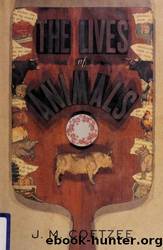The Lives of Animals by J. M. Coetzee & Amy Gutmann

Author:J. M. Coetzee & Amy Gutmann [Coetzee, J. M. & Gutmann, Amy]
Language: eng
Format: epub
Tags: The Lives of Animals, Literary, Fiction
ISBN: 9780691004433
Google: -_ppewAACAAJ
Publisher: PrincetonUP
Published: 1999-07-15T17:36:22+00:00
REFLECTIONS
â
This page intentionally left blank
Marjorie Garber
â
âWe are here tonight,â he informed the au-
dience, âto listen to a lecture.â
Kingsley Amis, Lucky Jim
THE TANNER LECTURES sponsored by the Princeton University Center for Human Values were organized this year with special attention to disciplinarity and its discontents. Novelist John Coetzeeâs two lectures, âThe Philosophers and the Animalsâ and
âThe Poets and the Animals,â met with responses from four scholars with widely different disciplinary (or interdisciplinary) trainings: an animal ethicist, a biologist, a historian of religion, and a literary critic.
Even within Coetzeeâs lecture-narratives themselves, we might note, some characters express anxiety about disciplines and their authority. The college president, we learn, used to be a political scientist. (What is he now?) âThatâs just anthropology,â scoffs Norma, the philosopher of mind, when the subject of dietary laws comes up. And novelist Elizabeth Costello is equally dismissive of certain social science experiments which she regards as mere imbecilities.
In view of these partitions of knowledge, I thought I had better pose some questions having to do with the disciplines I was trained in or might be supposed to know something aboutâdisciplines like literature, psychoanalysis, gender theory, cultural studies, and Shakespeare (which has emerged in recent years as 7 3
R E F L EC T ION S
virtually a discipline unto itself). Here were the questions that came to my mind.
⢠What does the form have to do with the content?
This is a central question for all literary critics, of whatever generation and vintageâand with a novelist of this skill and art-fulness (I mean John Coetzee, not Elizabeth Costello) itâs a con-sistently rewarding one.
So, âWhat does the form of these lectures have to do with the content?â was my first question.
And my second, prompted by psychoanalysis, was:
⢠What does the form of these lectures displace, repress, or dis-avow? What is striking in its absence here?
⢠What are the relationships between the sexes, and between family members, in Coetzeeâs narrative?
This was a third kind of question, a gender-and-sexuality question. Why should a classic sexual triangle of the human social and cultural world (mother-son-sonâs wife) animate an argument about animals?
And this led me to yet another question, driven by my own recent interest in animal-human relations and what Iâve called
âdog loveâ:1
⢠What does the emphasis on animals tell us about people?
Youâll see that in a way this is a version of the displacement question. But it is also built into the very form and content of Coetzeeâs Lives of Animals, from the concern about Holocaust analogies to the framing of the whole narrative between referencesâat the beginning and the endâto the motherâs arrival at and departure from the airport and to her âold flesh.â If sheâs flying, sheâs also dying.
Finally, and most crucially perhaps for this occasion, which was, after all, a series sponsored by the Center for Human Values: 1 Marjorie Garber, Dog Love (New York: Simon & Schuster, 1996).
7 4
M AR JOR I E G ARBE R
⢠What, if anything, is the âvalueâ of literary study in todayâs academy and
Download
This site does not store any files on its server. We only index and link to content provided by other sites. Please contact the content providers to delete copyright contents if any and email us, we'll remove relevant links or contents immediately.
The Lonely City by Olivia Laing(4798)
Animal Frequency by Melissa Alvarez(4461)
All Creatures Great and Small by James Herriot(4311)
Walking by Henry David Thoreau(3953)
Exit West by Mohsin Hamid(3823)
Origin Story: A Big History of Everything by David Christian(3687)
COSMOS by Carl Sagan(3617)
How to Read Water: Clues and Patterns from Puddles to the Sea (Natural Navigation) by Tristan Gooley(3460)
Hedgerow by John Wright(3354)
How to Read Nature by Tristan Gooley(3335)
The Inner Life of Animals by Peter Wohlleben(3310)
How to Do Nothing by Jenny Odell(3293)
Project Animal Farm: An Accidental Journey into the Secret World of Farming and the Truth About Our Food by Sonia Faruqi(3212)
Origin Story by David Christian(3194)
Water by Ian Miller(3177)
A Forest Journey by John Perlin(3068)
The Plant Messiah by Carlos Magdalena(2927)
A Wilder Time by William E. Glassley(2858)
Forests: A Very Short Introduction by Jaboury Ghazoul(2836)
